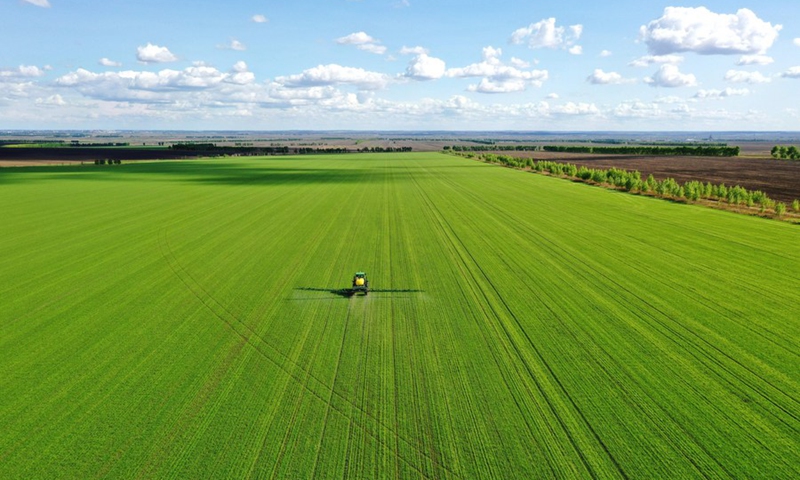
Photo taken on May 27, 2021 shows a self-propelled sprayer at work on a farm in Heihe, northeast China's Heilongjiang Province. (Photo: Xinhua)
China's Ministry of Agricultural and Rural Affairs (MOA) and the Ministry of Finance have issued a notice in recent days, requiring local authorities to mull over an "all-out effort" to guarantee the harvest of summer wheat and expand the plantation of soybeans "by all means," said a statement on the website of the MOA on Friday.
The notice, coming at a time when the protracted Russia-Ukraine conflict has stretched global food supply ranging from corn, wheat to even potash fertilizer and pushed their prices to record highs, identified the priority work for China's food production in 2022 and a batch of supportive policies to stabilize the fundamentals of the agricultural industry.
While some politicians warned that the escalating tensions could cause a potential "global food crisis," observers stressed that China's food security is not threatened though the country needs to guard against spillover effect of a price hike from global market.
Under the notice, local authorities will release one-time subsidies to farmers to alleviate the impact of agricultural materials' price hikes. Authorities will also offer subsidies to corn, soybean and rice producers, properly raising the minimum purchase price of rice and wheat, as well as implement the plantation subsidies to farmers who boost crop cultivation of corn and soybeans.
In addition, Chinese agricultural authorities also support the plan to build new 100 million mu (6.67 million hectare) of high standard farmland, carry out the seed industry revitalization plan, and offer subsidy policies for purchasing agricultural machinery and tools to improve the comprehensive ability of food production.
The latest notice represents a fresh effort by Chinese authorities to secure spring ploughing and summer grain harvest in the face of rising geopolitical uncertainties and unfavorable weather condition like the flooding that happened last year.
Chinese Premier Li Keqiang said during an inspection visit to the MOA on Wednesday that China should always stand on guard over its food security and ensure stable production and supply to hedge external uncertainties.
On Wednesday, China also released 1 million tons of national potash fertilizer reserves to meet production needs during this year's spring farming period, according to the country's top economic planner.
French President Emmanuel Macron warned of "an unprecedented food crisis" on Thursday during the G7 and NATO summits. He said the food crisis will be even worse in 12 to 18 months as Ukraine, a major grower of wheat, barley, corn and sunflower, will not be able to sow crops, Reuters reported.
China's Foreign Ministry spokesperson Wang Wenbin said at a regular press briefing on Friday that the Russia-Ukraine situation has dealt a heavy blow to global trade, finance, energy and food supply chain, worsening an already struggling world economy.
"Citizens of individual country do not bear the reasonability to pay for geopolitical tensions and big power wrestling, and China will continue playing a constructive role in easing tensions, and is willing to strengthen communication and cooperation with every party to inject energy into the stable and sound development of global economy," Wang noted.
Li Guoxiang, a research fellow at the Chinese Academy of Social Sciences, told the Global Times on Friday that such crisis warning is not an exaggeration as Russia and Ukraine jointly account for 20 percent of global supply of wheat, barley and corn, and their exports are quite disperse, involving a number of countries.
According to media reports, wheat prices have increased by 21 percent, barley by 33 percent and some fertilizers by 40 percent since the tensions escalated last month.
Li said it is likely that the dwindling supply could pose hunger threat to low-income countries, and further drive inflation in developed nations including the US and Europe, though the impact on China's food security could be "much smaller."
China only imported 5.9 percent of wheat last year, and most is sourced from the US and Canada. A Citi report also showed that only 9.4 percent of domestic corn consumption in 2021 came from imports last year. And Ukraine supplies around 30 percent of China's corn imports.
"China has prioritized expanding domestic production to fill up the vacancy of Ukraine imports, and this will mitigate potential impact to a large extent," Li said, noting that China is also guarding against the spillover effect of international grain price hikes on the Chinese market.


